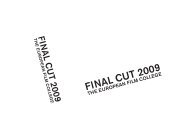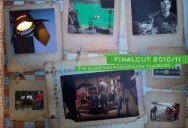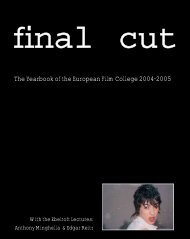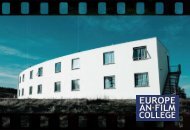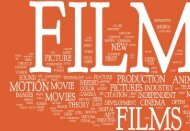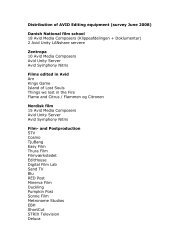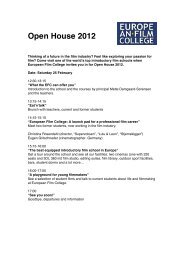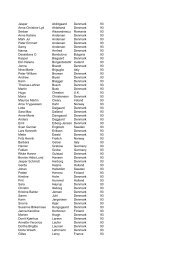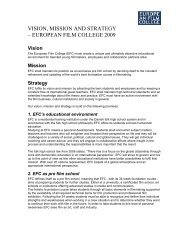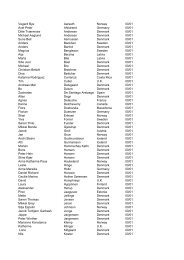yearbook 2004/05 - The European Film College
yearbook 2004/05 - The European Film College
yearbook 2004/05 - The European Film College
Create successful ePaper yourself
Turn your PDF publications into a flip-book with our unique Google optimized e-Paper software.
Principal and teachers:<br />
Jens Rykær: Principal<br />
Danish. Trained as a teacher, then<br />
in 1972 graduated in film history<br />
and psychology from the University<br />
of Copenhagen. Subsequently<br />
worked on a variety of film magazines<br />
and in other film-related<br />
jobs, becoming manager of the<br />
Herlev cinema in 1979. 1998-<br />
1999: President of the Danish<br />
Cinema Association (DBF) and<br />
of the Innovative committee of<br />
the <strong>Film</strong> Industry (FSI), an organisation<br />
charged with increasing<br />
public interest in cinema through<br />
festivals, seminars, political lobbying<br />
etc. Since 1991, Jens has been<br />
a member of the Board (and since<br />
2001 President of the Board) of<br />
MEDIA Salle (an EU programme<br />
for mainstream cinemas). He is<br />
also on the Board of Europa Cinemas<br />
(concerned with <strong>European</strong> art<br />
cinemas). Since 1998 he has been<br />
editor of <strong>Film</strong> Guide, a monthly<br />
publication presenting upcoming<br />
cinematic events throughout<br />
Denmark.<br />
Courses: Running a cinema<br />
This course deals with all the<br />
theoretical and practical aspects<br />
in relation to running a cinema<br />
commercially. What are the responsibility<br />
areas of the cinema<br />
manager? Where do the films<br />
come from? What kind of deals<br />
can you strike with distributors?<br />
What are the managers tools for<br />
promoting and programming the<br />
cinema? Advertising - where, how,<br />
why? What kind of profile do you<br />
wish to enhance and what are your<br />
niches? Economy. Demographic<br />
analysis - who and where is your<br />
audience? We shall bring in a<br />
wider perspective of the national,<br />
<strong>European</strong> and American<br />
exhibition/distribution situation<br />
analysing it from a cultural, artistic<br />
and financial point of view.<br />
Hopefully, we shall have time to<br />
visit a couple of other very differ-<br />
ent cinemas. Also you will learn<br />
how to prepare films for projection<br />
and do the actual projection<br />
yourself in Big Bear.<br />
Susanne Kiær Katz:<br />
Lady Principal<br />
Danish. Qualified in 1974 as a<br />
teacher of Danish, English and<br />
French and until 2000 taught<br />
languages and cookery at Søborg<br />
skole in a suburb of Copenhagen.<br />
Since 1990 she has been an examination<br />
marker in written Danish<br />
for the Ministry of Education.<br />
Since coming to the EFC Susanne<br />
has combined teaching at a local<br />
school in Ebeltoft with teaching<br />
Danish for foreigners at the EFC<br />
and administering the Big Bear<br />
cinema. She was the founder, and<br />
is now a Board member, of the<br />
Ebeltoft Children’s <strong>Film</strong> Club,<br />
and regularly writes about forthcoming<br />
films at the Big Bear and<br />
other events at the EFC for the local<br />
Ebeltoft newspaper.<br />
Courses: Danish for foreigners<br />
Mark Le Fanu:<br />
<strong>Film</strong> history<br />
British. 1971: graduated in Literature<br />
from Cambridge University.<br />
1972-80: taught in the English faculty<br />
at Cambridge. Subsequently<br />
a freelance film critic and journalist<br />
writing for numerous publications,<br />
UK correspondent for Variety’s<br />
International <strong>Film</strong> Guide and<br />
the French film magazine Positif,<br />
author of <strong>The</strong> Cinema of Andrei<br />
Tarkovsky, BFI, 1987. Lecturer in<br />
<strong>Film</strong> Studies at Regent’s<br />
<strong>College</strong> London and the National<br />
WHO’s WHO<br />
<strong>Film</strong> and Television School (UK),<br />
1991-1992: Senior Reporter,<br />
Screen Finance.<br />
Courses:<br />
<strong>Film</strong> History Offered during all<br />
course periods, the course covers<br />
the history of film as an art form<br />
from its origins to the present day.<br />
Structure and aesthetics of the<br />
short film: <strong>The</strong> short film is a genre<br />
of its own, different from the fulllength<br />
feature. What are the main<br />
qualities that go into making an<br />
interesting short? What can, and<br />
what cannot, be dispensed with?<br />
We stil look at the place in short<br />
film aethetics of such topics as<br />
symbolism, use of objects, character<br />
development, surprise endings<br />
and so on. We will explore the<br />
terrain by looking at pre-existing<br />
examples of the genre, and later<br />
in the course we will experiment<br />
with scripting some examples of<br />
our own.<br />
East is East<br />
East is East... and West is West (as<br />
the old saying goes) and never the<br />
two shall meet. How true is this<br />
feeling. Not in the film world,<br />
anyway, there Tarantino “swears<br />
by” Wong kar Wai, and Godard<br />
tells us we have not lived until<br />
we have seen at least one film by<br />
Mizoguchi. What can the West<br />
learn from the East? Who are the<br />
indispensable greats of Asian cinema?<br />
Let’s explore the topic, taking<br />
in those films by Wong kar Wai<br />
and Mizoguchi and also others by<br />
Zhang Yimou, Chen Kaige, Tian<br />
Zhuanzhuan - along with Japanese<br />
masterpieces by Kurosawa, Ozu,<br />
Imamura and Oshima - the great<br />
names. Obviously “Asia” is a huge<br />
topic and we will need to follow<br />
a few chosen parameters carefully.<br />
But there is much to explore and<br />
find out about, and, hopefully, enjoyment<br />
to be gained on the way.<br />
Petru Maier:<br />
Cinematography<br />
Danish. 1983: Graduated from<br />
the Institute of <strong>The</strong>atre and <strong>Film</strong><br />
Art, Bucharest, with a BA in Cinematography.<br />
1986-1990: studied<br />
languages at the University of Bucharest<br />
while working in the film<br />
industry. 1983-1990: worked as a<br />
1st Assistant, 2nd Unit Director of<br />
Photography and Director of<br />
Photography at the Motion Pictures<br />
Studios, Bucharest, Romania.<br />
Credits include features,<br />
documentaries and commercials.<br />
Debut as Director of Photography<br />
in 1989. 1990: Director of Photography<br />
for a short feature<br />
produced in co-operation with the<br />
Danish <strong>Film</strong> Workshop. Member<br />
of Dansk <strong>Film</strong>fotograf Forbund.<br />
He is also a Board Member of the<br />
Union of Danish <strong>Film</strong>workers.<br />
Courses:<br />
Basics of Video camera<br />
Designed to provide basic knowledge<br />
in the operation of Sony<br />
DXC-D30P digital video camera<br />
and sage usage of it, as well as basics<br />
of shooting:<br />
- how a video camera works;<br />
TV systems, video formats<br />
- camera controls; layout<br />
and functions;<br />
- lenses and camera movements;<br />
- safety routines;<br />
- small assignments<br />
Silver or Iron Oxide<br />
A practical comparative study of<br />
imaging systems This is a practical<br />
continuation of Photography<br />
and Framing and Picture and<br />
Language although there are no<br />
prerequisites for taking the course,<br />
it is open for everybody. <strong>The</strong><br />
course deals with the control of<br />
image. From the artistic concept<br />
and complex symbolism, the images<br />
have to pass from the head of



